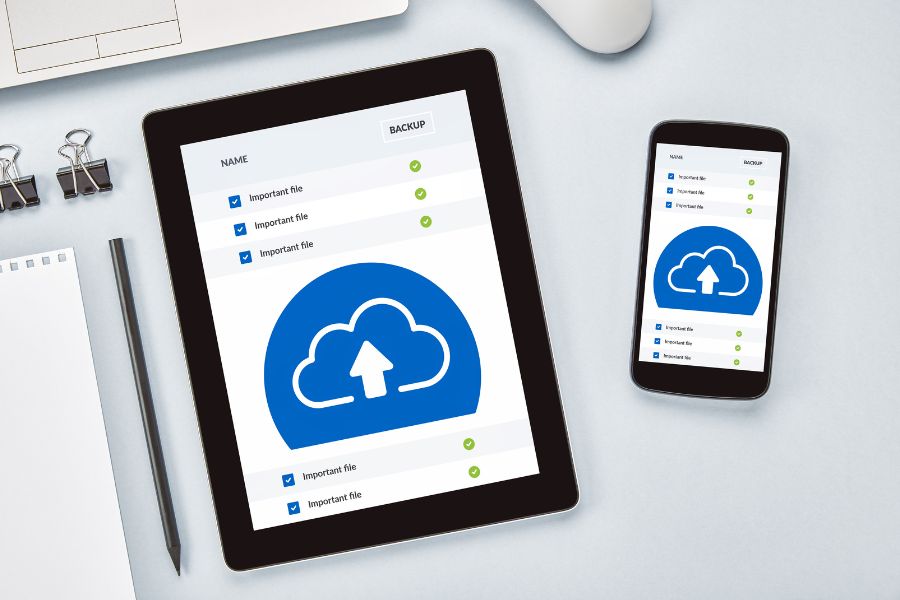In the realm of remote work, managing and securing files is a critical aspect of maintaining productivity and protecting sensitive information. Two of the most common solutions for file storage are cloud storage vs external hard drives.
Both options offer unique advantages and drawbacks, particularly when it comes to security, accessibility, and reliability. But which one is safer for remote work files?
This article will compare cloud storage vs external hard drives, examining their security features, ease of use, cost, and overall impact on remote work efficiency.
By the end, you’ll have a clear understanding of which storage solution is better suited for your remote work needs.
1. The Importance of Secure File Storage in Remote Work
Before diving into the comparison, it’s important to understand why secure file storage is critical for remote workers. Remote work often involves handling sensitive data, collaborating with team members, and accessing files from various locations.
A secure and reliable storage solution ensures that:
- Data is Protected: Safeguard sensitive information from unauthorized access, loss, or corruption.
- Files are Accessible: Easily access and share files with team members, regardless of location.
- Workflows are Efficient: Streamline file management and collaboration, enhancing productivity.
Both cloud storage and external hard drives can meet these needs, but they do so in different ways and with varying levels of security.
2. The Case for Cloud Storage

Cloud storage allows users to store files on remote servers, accessible via the internet. Let’s explore the advantages of cloud storage for remote work files.
2.1 Enhanced Security Features
Cloud storage providers offer robust security measures to protect your files.
- Encryption: Files are encrypted both in transit and at rest, ensuring they are secure from unauthorized access.
- Two-Factor Authentication (2FA): Adds an extra layer of security by requiring a second form of verification.
- Regular Backups: Automatic backups ensure that your files are safe even in the event of hardware failure or data loss.
2.2 Accessibility and Convenience
Cloud storage allows you to access your files from anywhere with an internet connection.
- Remote Access: Easily access and share files from any device, whether you’re at home, in a café, or traveling.
- Collaboration: Share files with team members and collaborate in real-time, enhancing productivity.
2.3 Scalability
Cloud storage offers flexible storage options that can grow with your needs.
- Pay-as-You-Go: Pay only for the storage you use, with the ability to upgrade as your needs increase.
- Unlimited Storage: Some providers offer unlimited storage plans for businesses.
2.4 Disaster Recovery
Cloud storage provides reliable disaster recovery options to protect your files.
- Redundancy: Files are stored on multiple servers, ensuring they are safe even if one server fails.
- Versioning: Access previous versions of files, allowing you to recover from accidental changes or deletions.
2.5 Integration with Other Tools
Cloud storage integrates seamlessly with other productivity tools and platforms.
- Productivity Suites: Works well with tools like Google Workspace, Microsoft 365, and project management software.
- Automation: Automate file backups, syncing, and sharing to streamline workflows.
3. The Challenges of Cloud Storage
While cloud storage offers many benefits, it also comes with challenges that can impact its security and reliability.
3.1 Internet Dependency
Cloud storage requires a stable internet connection for access and file transfers.
- Connectivity Issues: Poor internet can lead to slow access or inability to retrieve files.
- Offline Access: Limited ability to access files without an internet connection.
3.2 Security Concerns
Despite robust security measures, cloud storage is not immune to risks.
- Data Breaches: Cloud servers can be targeted by hackers, leading to potential data breaches.
- Privacy Issues: Storing sensitive data on third-party servers may raise privacy concerns.
3.3 Cost Over Time
While cloud storage can be cost-effective initially, costs can add up over time.
- Subscription Fees: Ongoing subscription fees can become expensive, especially for large storage needs.
- Data Transfer Costs: Some providers charge for data transfer, which can increase costs.
3.4 Compliance and Legal Issues
Storing data in the cloud may raise compliance and legal concerns, particularly for sensitive industries.
- Data Sovereignty: Ensure that data is stored in compliance with local laws and regulations.
- Third-Party Control: Relying on third-party providers for data storage may pose legal risks.
4. The Case for External Hard Drives

External hard drives are physical storage devices that connect to your computer via USB or other interfaces. Let’s explore the advantages of using external hard drives for remote work files.
4.1 Physical Security
External hard drives offer a high level of physical security for your files.
- Offline Storage: Files are stored offline, reducing the risk of cyberattacks and unauthorized access.
- Portability: Easily transport and store files in a secure location, such as a locked drawer or safe.
4.2 No Internet Dependency
External hard drives do not require an internet connection for access.
- Offline Access: Access files anytime, anywhere, without needing an internet connection.
- Reliability: No risk of connectivity issues or service outages affecting access to files.
4.3 One-Time Cost
External hard drives involve a one-time purchase, making them cost-effective in the long run.
- No Subscription Fees: Pay once for the device, with no ongoing costs.
- Large Storage Capacity: High-capacity drives are available at relatively low prices.
4.4 Control Over Data
External hard drives give you full control over your data.
- No Third-Party Involvement: Your data is not stored on third-party servers, reducing privacy concerns.
- Custom Backup Solutions: Create custom backup schedules and solutions tailored to your needs.
4.5 Durability and Longevity
High-quality external hard drives are built to last, providing reliable long-term storage.
- Robust Construction: Durable designs that can withstand physical wear and tear.
- Long Lifespan: Properly maintained drives can last for many years.
5. The Challenges of External Hard Drives
While external hard drives offer many benefits, they also come with challenges that can impact their security and reliability.
5.1 Risk of Physical Damage
External hard drives are susceptible to physical damage and failure.
- Hardware Failure: Drives can fail due to mechanical issues, leading to data loss.
- Physical Damage: Drops, spills, or exposure to extreme conditions can damage the drive.
5.2 Limited Accessibility
External hard drives require physical access, which can be inconvenient for remote work.
- Portability Constraints: Need to carry the drive with you to access files, which can be cumbersome.
- Sharing Limitations: Difficult to share files with team members who are not physically present.
5.3 Manual Backups
External hard drives require manual backups, which can be time-consuming and prone to human error.
- Backup Frequency: Regular backups are necessary to ensure data is up-to-date and secure.
- Human Error: Risk of forgetting to back up files or making errors during the backup process.
5.4 Limited Storage Capacity
While external hard drives offer large storage capacities, they are still limited compared to cloud storage.
- Storage Limits: High-capacity drives can be expensive and may still not meet the needs of large-scale data storage.
- Multiple Drives: Managing multiple drives can become cumbersome and disorganized.
5.5 Security Risks
While external hard drives offer physical security, they are not immune to risks.
- Theft or Loss: Drives can be stolen or lost, leading to potential data breaches.
- Unauthorized Access: If not properly secured, drives can be accessed by unauthorized individuals.
6. Key Factors to Consider
When choosing between cloud storage and external hard drives, consider the following factors to determine which option is safer and more efficient for your remote work files.
6.1 Security Needs
Evaluate your security requirements and how each option meets them.
- Data Sensitivity: Cloud storage offers robust encryption and security features, while external hard drives provide physical security.
- Access Control: Consider who needs access to the files and how each option facilitates secure access.
6.2 Accessibility Requirements
Think about how and where you need to access your files.
- Remote Access: Cloud storage allows for easy remote access and sharing, while external hard drives require physical access.
- Offline Access: External hard drives provide reliable offline access, while cloud storage depends on internet connectivity.
6.3 Budget
Assess your budget and determine how much you’re willing to invest in file storage.
- Upfront Costs: External hard drives involve a one-time purchase, while cloud storage requires ongoing subscription fees.
- Long-Term Costs: Consider the long-term costs of each option, including potential upgrades and maintenance.
6.4 Data Volume
Consider the volume of data you need to store and how each option accommodates it.
- Large Data Sets: Cloud storage offers scalable solutions for large data sets, while external hard drives have limited capacity.
- Small to Medium Data Sets: External hard drives may be sufficient for smaller data sets, with the option to use multiple drives if needed.
7. Key Takeaways and Recommendations
Deciding between cloud storage and external hard drives depends on your specific needs, security requirements, and budget. Here are some key takeaways and recommendations to help you choose.
- Choose Cloud Storage If: You need remote access, robust security features, and scalable storage options, and you have a reliable internet connection.
- Choose External Hard Drives If: You prioritize physical security, offline access, and a one-time cost, and you have manageable data storage needs.
- Consider a Hybrid Approach: Use cloud storage for remote access and collaboration, and external hard drives for offline backups and sensitive data.
Conclusion
The choice between cloud storage vs external hard drives ultimately depends on your specific needs, security requirements, and work environment.
Cloud storage offers enhanced security, remote accessibility, and scalability, making it ideal for remote workers who need to access and share files from anywhere.
External hard drives provide physical security, offline access, and a one-time cost, making them suitable for those who prioritize data control and have manageable storage needs.
By carefully evaluating your priorities and testing both options, you can select the storage solution that best supports your remote work efficiency and data security.
As remote work continues to evolve, having the right storage solution in place will be key to maintaining productivity and protecting sensitive information.
